Somerset: Rebuilding the Ecological Network
Introduction
Collaboration lies at the heart of this project, which works to promote peatland restoration and rebuild nature at a landscape-scale in the Somerset Levels and Moors. Many of the initiatives currently being undertaken involve active partnership working.
Description
The Somerset Levels and Moors is the largest area of lowland wet grassland (floodplain and coastal grazing marshes) and associated wetland habitats remaining in England. The moors are an extensive low-lying basin peat, with a few remnants of raised bog, surrounded by alluvial silt and clay. Overlain in places by a varying thickness of riverine clay, peat is still extracted from certain areas.
Project Aims
Working together towards agreed objectives There is recognition amongst key stakeholders with an interest in the Somerset Levels and Moors that:
- Peatland restoration and rebuilding nature will be more successful where schemes are co-designed, co-created and co-delivered by the farming and conservation sectors working effectively together
- Farming systems must be profitable to provide the best opportunities for landscape scale restoration within the floodplains and wetlands
- New sources of funding need to be developed, alongside the agri-environment schemes, to provide a wider range of options and enable more farmers and land owners to rebuild the key elements of the ecological network at a landscape-scale
- New approaches to the management of flood risk, water levels and water quality need to be explored and tested alongside profitable farming to restore and ensure sustainable management of the peatlands, aiming over time to find efficient mechanisms to enable a transition to land use that best delivers the available food, water, nature and carbon benefits the Levels can provide.
A Levels and Moors ‘Task Force’ has been set up, comprising of key stakeholders who have an interest in the area. This group is lobbying to achieve the best possible future for the area. In addition, a ‘Nature Delivery Group’, comprising Royal Society for the Protection of Birds (RSPB), Somerset Wildlife Trust, Farming and Wildlife Advisory Group (FWAG SW), National Farmers Union, Somerset Drainage Board Consortium, and Somerset County Council, with the Environment Agency and Natural England, provides a platform to exchange knowledge, ideas, and information on opportunities.
Site Activity
The European-funded ‘WAVE’ (Water Adaptation is Valuable for Everyone www.waveproject.eu) INTERREG IVB NWE project, managed by Somerset County Council, aims to better understand the likely impacts of climate change and the adaptations that will be required to deal with these.
The funding is used on projects working to promote more sustainable approaches to land and water management in key areas:
Theme 1: Delivery for habitats and species through restoration of extant peat workings
Case study: Somerset Wildlife Trust’s Brue Valley Living Landscape programme covers 12,500 ha of mixed peat wetland habitats. Peatland restoration is being achieved via a number of different mechanisms ranging from strategic land purchase and restoration through to assisting land managers gain access to agri-environment subsidies and working with them to ensure that the prescriptions are met and benefits to biodiversity increase.
Theme 2: Delivery for species and communities on lowland wet peat grasslands
Case study: When the RSPB purchased Greylake nature reserve in 2003 the area consisted of 100 ha of deep-drained arable land. Over the last nine years, a process of restoration has created a mixture of wet grassland, swamp and fen habitats. Structures have been installed to hold water levels around 80 cm higher than before management began. Monitoring, which started in 1977, shows that the once declining population of Lapwing at Greylake are now starting to recover.
Project Name: Somerset: Rebuilding the Ecological Network
Organisation / Lead partner: Somerset County Council
Predominately: Upland










